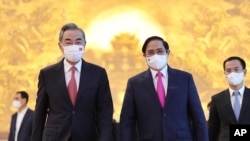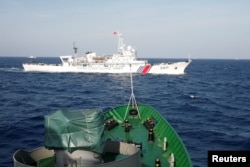Although Vietnam has been cautious about accepting Chinese money through Beijing’s Belt and Road Initiative (BRI), Hanoi will be facing pressure to take grants offered under the scheme when President Xi Jinping visits Hanoi this week as the Southeast Asian country seeks to balance its relationships with China and the United States.
The initiative, introduced by Xi in 2013, is seen as a long-term strategy by China to enhance its influence in the world by providing its support and financial aid.
Southeast Asia, including Vietnam, occupies a central position on China’s BRI map. According to an assessment of the U.S. Council on Foreign Relations research center, Southeast Asia is where the land “Belt” and the sea “Road” of the massive initiative converge.
While some countries in the region welcome BRI funds, Vietnam is cautious, according to analysts.
“Vietnam said it supported China's Belt and Road Initiative, with Vietnamese leaders regularly attending BRI forums organized by China,” Le Hong Hiep of the Singapore-based ISEAS-Yusof Ishak Institute told VOA Vietnamese in a phone interview late last month. “However, in practice, Vietnam does not actively participate in projects within the framework of the BRI or receive investment funding under the initiative’s scheme.”
While Chinese Ambassador to Hanoi Xiong Bo said in November 2021 that a series of large Vietnamese projects had been included in the BRI, Hanoi has not publicly announced any projects under the Chinese initiative.
“This shows Vietnam's careful mentality and attitude in taking loans through official channels from China,” said Hiep, a political analyst on Vietnamese and Southeast Asian issues.
Similarly, Murray Hiebert, an author and a senior associate of the Southeast Asia Program at the Washington-based Center for Strategic and International Studies, said that "Vietnam's praise for the BRI is primarily diplomatic posture to soothe China. Hanoi has no real interest in the BRI for infrastructure, although it accepts real estate and manufacturing investment from Chinese companies.”
Vietnam's caution toward China's BRI projects stems from the disagreement between the two countries on island sovereignty, according to experts. The neighboring communist countries, although ideologically united, are in conflict over territorial waters.
Vietnam has repeatedly accused China of violating its sovereignty by sending ships into its exclusive economic zone and militarizing what Vietnam calls the East Sea, known by others as the South China Sea.
“Vietnam does not want to be beholden to China on critical infrastructure at a time that they have serious differences in the South China Sea,” Hiebert said.
Bad experiences with Chinese-contracted projects in the past is another reason for Vietnam to eye BRI warily, according to experts.
The Cat Linh-Ha Dong railway saw its cost balloon to $868 million from the initial estimate of $552.8 million. Stretching 13 kilometers, Hanoi’s first metro line was delayed for almost a decade because of prolonged implementation by a Chinese contractor, sparking outrage in Vietnam.
“The learned lesson made Vietnam cautious about Chinese loans, either under BRI or not,” said Hiep. “Chinese loans often come with the obligation of using Chinese contractors and equipment,” and Vietnam doesn’t want a repeat of the metro experience.
Warning about China's BRI initiative, Pham Sy Thanh, director of the China Economic Research Program under Vietnam’s National Economics University, said that about 70% of BRI projects involve Chinese contractors or workers, according to state media.
Hanoi refused Beijing's loan to build the Van Don-Mong Cai high-speed rail route and did not let Chinese technology giant Huawei participate in developing Vietnam's 5G telecommunications infrastructure. Vietnam cited national security concerns for its decision to turn down Chinese investment.
While BRI has helped bring roads, rails and infrastructure to many poor countries, it has also left some of those countries saddled with debt.
Italy has become the first country to announce it will leave the BRI. Italian Prime Minister Giorgia Meloni in 2019 called the decision to join the BRI a “serious mistake” and said that the economic promises of the deal had never materialized.
Meanwhile, China continues to press Vietnam on BRI participation.
Vietnamese President Vo Van Thuong attended the Belt and Road Forum for International Cooperation and met with Xi on October 20. Xi urged Vietnam to "move more quickly to synergize the Belt and Road Initiative."
When visiting Hanoi this week, Xi is expected to urge Vietnam to embrace BRI, according to experts.
Xi arrives in Vietnam on Tuesday for a two-day visit. Xiong, Beijing's ambassador, said China was ready to offer Vietnam grants to boost the railway between Kunming and the Vietnamese port city of Haiphong and other transport links from southern China to Hanoi, according to the official Vietnamese state paper Tuoi Tre.
“I would not be surprised if Vietnam accepts one or two small projects that affect China’s economy more than they affect Vietnam’s,” said Hiebert.
The Vietnamese Foreign Ministry did not respond to VOA’s request for comment on the possibility of receiving grants from China. Prime Minister Pham Minh Chinh last month expressed support for the Kunming-Haiphong rail upgrade.
The distrust that most Vietnamese people feel toward China also comes from historical experiences, as reflected in ASEAN’s State of Southeast Asia survey. It found that two-thirds of Vietnamese respondents did not trust China's Global Security Initiative.
But infrastructure development cooperation with China, according to Hiep, is “a way for Vietnam to balance relations with Beijing in the context that Vietnam has just upgraded ties with the U.S. and its allies.”
Vietnam made an unprecedented two-step upgrade with the U.S. to put Washington on par with Beijing as comprehensive strategic partners when U.S. President Joe Biden visited in September. Vietnam also elevated South Korea last year and Japan last month to be its top partners.
“Vietnam will now feel that Biden has Hanoi’s back if something goes wrong with a China-funded project in Vietnam,” said Hiebert.
Improving relations with the U.S. and its allies is also part of an effort by Vietnam to diversify relations and reduce influence from Beijing, according to Hiebert.
“Vietnam does not want to fall into the orbit of any superpower," he said.
However, while Vietnam's imports from China still account for about one-third of the country's total imports, reducing dependence on Beijing is "not simple," according to Hiep.
“But upgrading relations with other countries and signing different FTAs [free trade agreements], in my opinion, is a necessary step to be able to create more favorable conditions in reducing dependence, in terms of trade with China in [the] long run,” he said.







